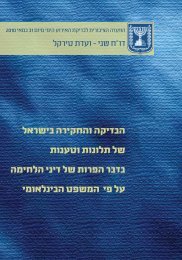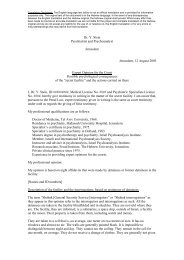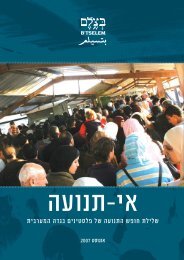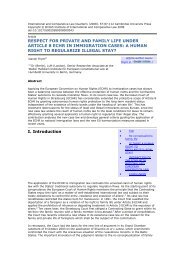HCJ 10650/03 Abu Gwella et. al v
HCJ 10650/03 Abu Gwella et. al v
HCJ 10650/03 Abu Gwella et. al v
You also want an ePaper? Increase the reach of your titles
YUMPU automatically turns print PDFs into web optimized ePapers that Google loves.
provided there was no security or crimin<strong>al</strong> grounds for rejection. 3 Following this<br />
decision, and for some time thereafter, the Respondents ceased handling requests to<br />
register children. Requests to register children were made in the context of the request<br />
for family unification submitted on beh<strong>al</strong>f of the spouse. In this matter, too, it was<br />
irrelevant where the child was born.<br />
See Section 5 of the l<strong>et</strong>ter of 28 November 1995 from Ms. Kerstein, executive director<br />
of P<strong>et</strong>itioner 6, to the then Minister of the Interior. The l<strong>et</strong>ter is attached her<strong>et</strong>o,<br />
marked P/22.<br />
The Respondents’ policy from 1996<br />
52. In 1996, the Respondents recognized the mistake in incorporating requests to register<br />
children in requests for family unification, and clarified that the request for family<br />
unification on beh<strong>al</strong>f of the spouse would be d<strong>et</strong>ermined separately from requests to<br />
register children. In her l<strong>et</strong>ter of 18 March 1996, Attorney Bakshi mentioned that,<br />
from then on, persons wanting to register their children would do so in a procedure<br />
separate from the request for family unification for the spouse, by compl<strong>et</strong>ing a form<br />
for child registration. Attorney Bakshi did not differentiate b<strong>et</strong>ween children born<br />
abroad and children born in Israel.<br />
The l<strong>et</strong>ter of Attorney Bakshi and the child registration request form, the form still<br />
used to register a child, are attached her<strong>et</strong>o, marked P/23 A-B, respectively.<br />
53. Also, the form used by the Respondents to approve requests to register children never<br />
differentiated b<strong>et</strong>ween children born in Israel and such children born elsewhere. The<br />
only difference b<strong>et</strong>ween a child born in Israel (and the status given him at birth or<br />
upon the “d<strong>et</strong>ermination” of the Minister in accordance with Section 12 of the Entry<br />
into Israel Regulations) and a child born outside of Israel (as to whom Section 12 did<br />
not apply, so the child received a residency permit) was that a fee was demanded in<br />
the case in which the child was born abroad. The demand for payment was written on<br />
the form approving the request, after the request was considered and approved. It<br />
should be mentioned that the Respondents began to demand a fee only at the end of<br />
the 1990s. 4<br />
The approv<strong>al</strong> issued by Respondent 3 to the request for registration of children born in<br />
the Occupied Territories, of 1997, in which no fee is demanded, is attached to the<br />
3<br />
The policy changed following <strong>HCJ</strong> 2797/93, Garbit v. Minister of the Interior<br />
(unpublished).<br />
4<br />
The P<strong>et</strong>itioners do not know the precise date. They learned about the fee in the course of<br />
their activity, from responses to specific requests sent by the Respondents and not from a<br />
notice or offici<strong>al</strong> procedure.<br />
17









